Kitchen countertops are a central element in kitchen design, impacting both aesthetics and functionality. The wide range of available styles offers homeowners numerous options to suit their tastes and needs. From classic materials like granite and marble to modern choices like quartz and concrete, each style brings its unique benefits and challenges. Selecting the right countertop involves considering factors such as durability, maintenance, cost, and overall kitchen design.
Granite countertops have long been a popular choice for their natural beauty and durability. Each slab of granite is unique, featuring a range of colors and patterns that can add a luxurious touch to any kitchen. Granite is highly resistant to heat and scratches, making it a practical option for busy kitchens. However, it does require regular sealing to prevent stains and maintain its polished appearance. Despite its higher cost, granite remains a favorite due to its timeless appeal and robust performance.
Marble countertops are synonymous with elegance and sophistication. Known for its distinctive veining and bright, light-reflective surface, marble adds a touch of luxury to any kitchen. While marble is slightly softer than granite and more prone to scratches and stains, it develops a beautiful patina over time, enhancing its natural beauty. Regular sealing and careful maintenance can help preserve marble’s pristine appearance. Its classic look makes it a preferred choice for those seeking a high-end, timeless aesthetic.
Quartz countertops offer a blend of beauty and practicality. Engineered from natural quartz crystals mixed with resin, these countertops are non-porous, highly durable, and resistant to stains, scratches, and heat. Available in a wide variety of colors and patterns, quartz can mimic the look of natural stone or offer more uniform and contemporary designs. Unlike natural stones, quartz does not require sealing, making it a low-maintenance option. Its versatility and ease of care make quartz a popular choice for modern kitchens.

Concrete countertops have gained popularity for their industrial and contemporary look. These countertops can be customized in terms of color, texture, and finish, offering a high degree of personalization. Concrete is extremely durable and can be cast into any shape, accommodating unique kitchen designs and features. However, concrete countertops are porous and require sealing to prevent stains and damage from moisture. They can also develop hairline cracks over time, adding to their rustic charm. The ability to tailor concrete countertops to specific design preferences makes them a unique and stylish option.
Butcher block countertops provide a warm, natural look that complements a variety of kitchen styles, from farmhouse to contemporary. Made from assembled wooden boards, butcher block countertops are perfect for food preparation and add a tactile, organic element to the kitchen. While they are susceptible to scratches, burns, and water damage, regular oiling can protect the wood and maintain its appearance. Some homeowners appreciate the natural wear and patina that develops with use, giving the countertop character and charm.
Laminate countertops are a budget-friendly option that offers a wide range of colors and patterns. Made from layers of paper or fabric impregnated with resin, laminate countertops are easy to clean and maintain. Advances in laminate technology have improved their durability and appearance, allowing them to mimic the look of more expensive materials like granite or wood. While laminate is less heat and scratch-resistant compared to other materials, its affordability and versatility make it a practical choice for many homeowners.
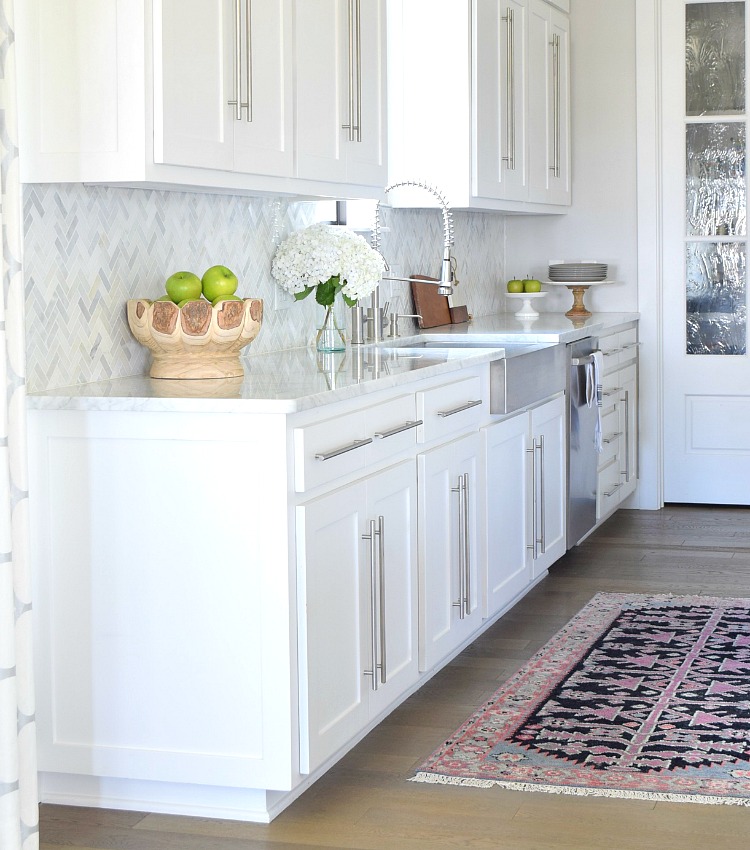
Solid surface countertops, such as Corian, are made from acrylic or polyester resins mixed with natural minerals. These countertops are non-porous, resistant to stains and bacteria, and can be seamlessly integrated with sinks and backsplashes for a sleek, uniform look. Solid surface countertops can be easily repaired if scratched or damaged, making them a durable and low-maintenance option. They are available in a wide range of colors and patterns, allowing for a high degree of customization to suit any kitchen design.
Stainless steel countertops offer a sleek, modern look that is both stylish and highly functional. Commonly found in professional kitchens, stainless steel is resistant to heat, stains, and bacteria, making it an excellent choice for serious cooks. The reflective surface can make a small kitchen feel larger and more open. However, stainless steel can scratch and show fingerprints, requiring regular cleaning to maintain its appearance. Its industrial aesthetic is ideal for contemporary kitchens with a minimalist design.
Soapstone countertops are valued for their natural beauty and soft, smooth texture. This natural stone comes in shades of gray with subtle veining and can darken over time, developing a rich patina. Soapstone is resistant to heat and stains, but its softer surface can scratch and chip. Regular oiling can enhance its color and protect the surface. Soapstone’s unique appearance and durability make it a desirable choice for those seeking a distinctive, low-maintenance countertop.
Glass countertops offer a striking, contemporary look that can make a bold design statement. Made from tempered glass, these countertops are highly durable, heat-resistant, and non-porous, making them easy to clean and maintain. Glass countertops can be customized in terms of color, texture, and thickness, and can incorporate features like embedded lighting for added visual impact. While they can be more expensive and prone to scratching, their unique aesthetic and design flexibility appeal to homeowners seeking a modern, high-end look.
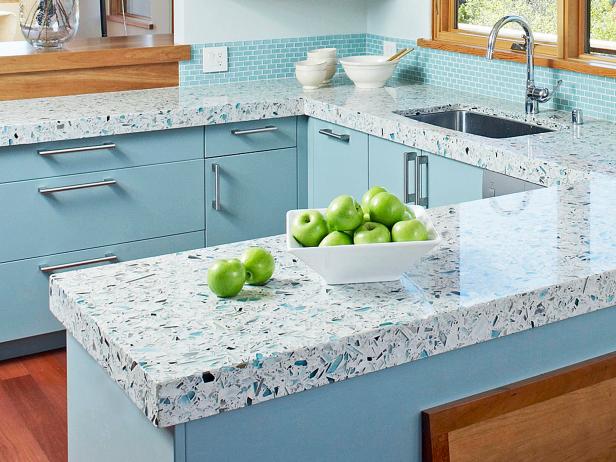
Tile countertops provide a versatile and customizable option for kitchen surfaces. Available in a wide range of materials, colors, and patterns, tile countertops can be tailored to match any design style. Ceramic and porcelain tiles are popular choices for their durability, heat resistance, and ease of maintenance. However, grout lines can stain and require regular cleaning to keep them looking fresh. The ability to create intricate designs and patterns makes tile countertops a creative and personalized choice.
Recycled materials countertops are an eco-friendly option for environmentally conscious homeowners. Made from recycled glass, paper, or aluminum, these countertops offer a sustainable alternative without compromising on style or durability. Recycled glass countertops, in particular, can create a stunning visual effect with their colorful, translucent surface. These countertops are durable, easy to maintain, and can contribute to a unique, eco-friendly kitchen design.
Porcelain countertops are a relatively new option that combines beauty and strength. Made from ceramic clay fired at high temperatures, porcelain is non-porous, highly resistant to heat, scratches, and stains, and can mimic the look of natural stone or other materials. Its durability and low maintenance requirements make it an attractive choice for busy kitchens. The wide range of colors and finishes available allows for great design flexibility.
Paper composite countertops, such as PaperStone, are made from recycled paper and resin, offering an eco-friendly and sustainable option. These countertops are durable, heat-resistant, and have a warm, organic look that complements various design styles. They are also non-porous, making them easy to clean and maintain. Paper composite countertops provide a unique blend of sustainability and functionality, appealing to environmentally conscious homeowners.
Choosing the right kitchen countertop involves balancing aesthetics, functionality, and budget. Each material offers its own set of advantages and challenges, and the best choice depends on individual preferences and kitchen requirements. Considering factors such as durability, maintenance, cost, and design compatibility can help homeowners select the perfect countertop for their kitchen.
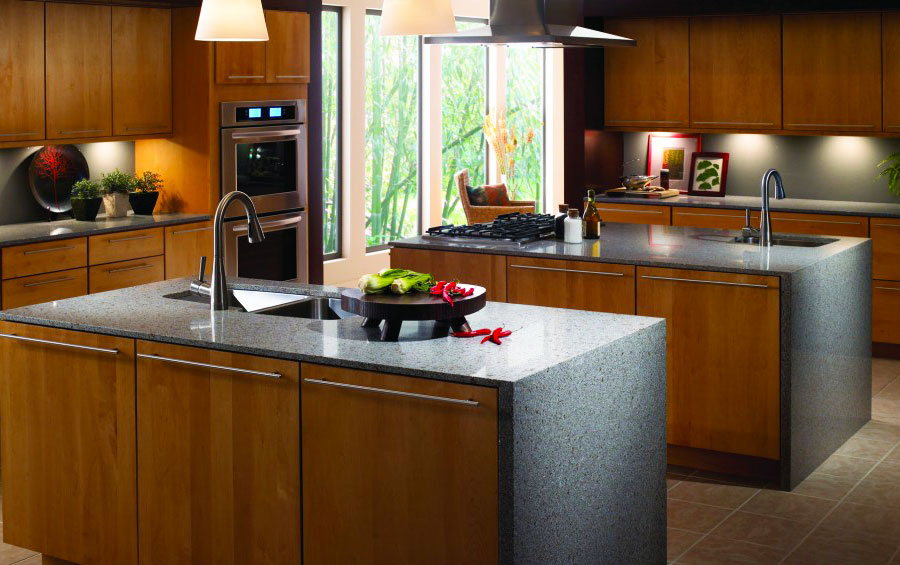
Common Mistakes to Avoid
One common mistake when choosing kitchen countertops is prioritizing aesthetics over functionality. While the look of the countertop is important, it’s crucial to consider how it will perform under daily use. A beautiful but high-maintenance material may not be practical for a busy kitchen.
Another mistake is not considering the long-term maintenance requirements. Some materials, like marble and wood, require regular sealing and maintenance to keep them looking their best. Homeowners should be prepared for the upkeep involved to avoid disappointment down the line.
Underestimating the impact of lighting on countertop appearance is another frequent error. The same countertop material can look very different under various lighting conditions. It’s important to see samples in your kitchen’s lighting before making a final decision.
Failing to account for the overall kitchen design is a common oversight. The countertop should complement the cabinets, flooring, and backsplash to create a cohesive look. Choosing a countertop in isolation can lead to a disjointed kitchen design.
Finally, not budgeting for installation costs can lead to unexpected expenses. Some countertop materials require professional installation, which can add significantly to the overall cost. Including installation in your budget can help avoid financial surprises.
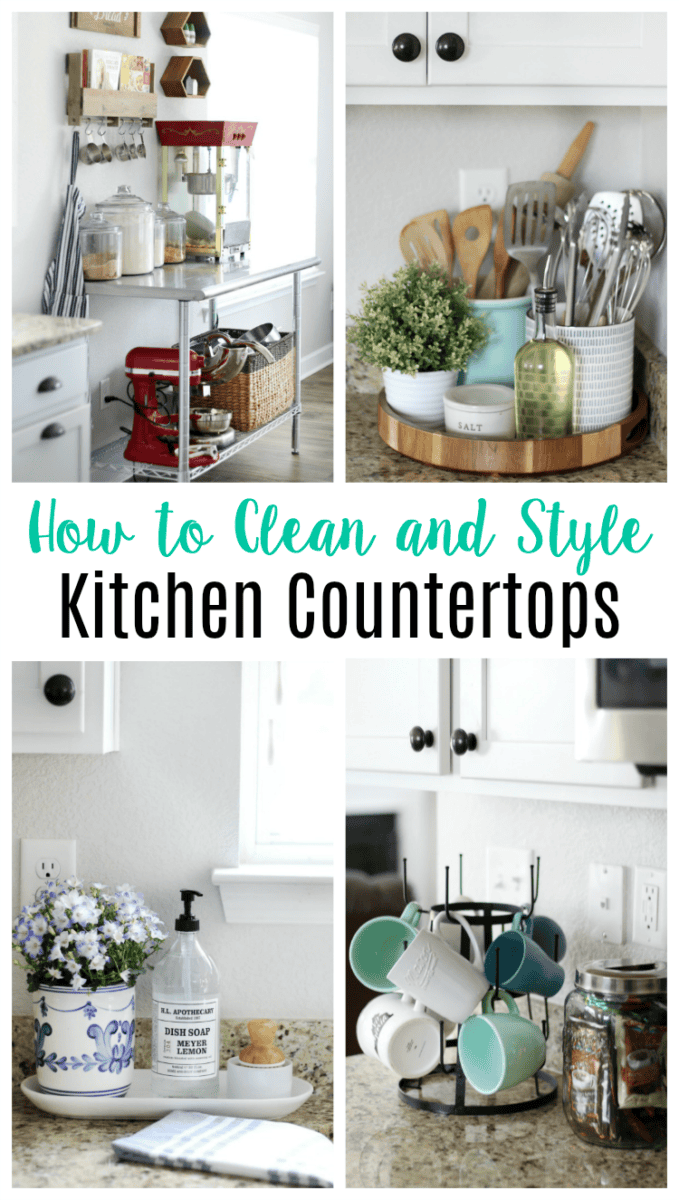
What is the most durable kitchen countertop material?
Quartz is often considered the most durable kitchen countertop material. Engineered from natural quartz crystals and resin, quartz countertops are non-porous, making them highly resistant to stains, scratches, and heat. They do not require sealing, unlike natural stone countertops, and are easy to maintain. Their uniform appearance and wide range of color options make quartz a popular choice for both durability and aesthetics. While granite is also highly durable and heat-resistant, it requires regular sealing to prevent staining. For those seeking a balance of durability and low maintenance, quartz is an excellent option.
How do I choose the right kitchen countertop material for my needs?
Choosing the right kitchen countertop material involves considering several factors, including durability, maintenance, cost, and design preferences. For a busy kitchen with heavy use, materials like quartz, granite, or stainless steel are excellent choices due to their durability and low maintenance requirements. If aesthetics and luxury are a priority, marble or soapstone might be preferred, though they require more care. Budget is another key consideration; laminate and tile offer affordable options with a wide range of styles. Visiting showrooms, obtaining samples, and consulting with professionals can help in making an informed decision that balances all these factors.
Are there eco-friendly options for kitchen countertops?
Yes, there are several eco-friendly options for kitchen countertops. Recycled materials countertops, such as those made from recycled glass, paper, or aluminum, offer sustainable choices without sacrificing style or durability. Paper composite countertops, like PaperStone, are made from recycled paper and resin, providing a durable and environmentally friendly option. Bamboo countertops are another sustainable choice, known for their renewable and fast-growing nature. These eco-friendly options not only reduce environmental impact but also offer unique aesthetics and functionality, appealing to homeowners who prioritize sustainability.
Can I install kitchen countertops myself, or should I hire a professional?
The decision to install kitchen countertops yourself or hire a professional depends on the material and your skill level. Materials like laminate, tile, and butcher block can be more DIY-friendly with proper tools and instructions. However, heavier and more complex materials like granite, quartz, and concrete often require professional installation due to their weight, precision cutting needs, and the use of specialized tools. Professional installation ensures that the countertop is properly fitted, sealed, and supported, which is crucial for durability and performance. Assessing your skills and the complexity of the project can help determine the best approach.
How do I maintain and clean my kitchen countertops?
Maintenance and cleaning vary depending on the countertop material. For quartz, use a mild detergent and water, avoiding harsh chemicals and abrasive cleaners. Granite and marble require regular sealing to prevent stains, and they should be cleaned with pH-neutral cleaners. Wood countertops need regular oiling to protect the surface and prevent drying out. Stainless steel countertops are best cleaned with a soft cloth and mild cleaner to avoid scratches. For all materials, wiping up spills promptly and using cutting boards and trivets can help protect the surface. Regular maintenance tailored to the specific material will keep your countertops looking their best.

HanStone Quartz USA 8 Beige Quartz Countertop Design Ideas

How to Style Kitchen Countertops – Marly Dice
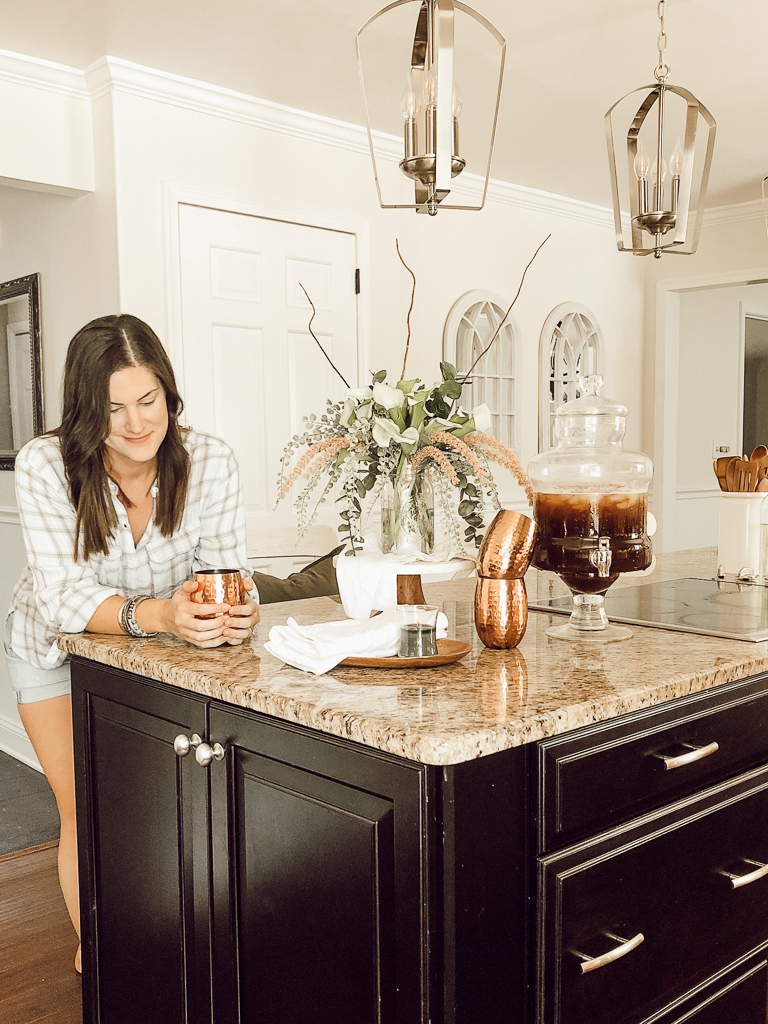
Ways to Style Kitchen Counters – Love Grows Wild
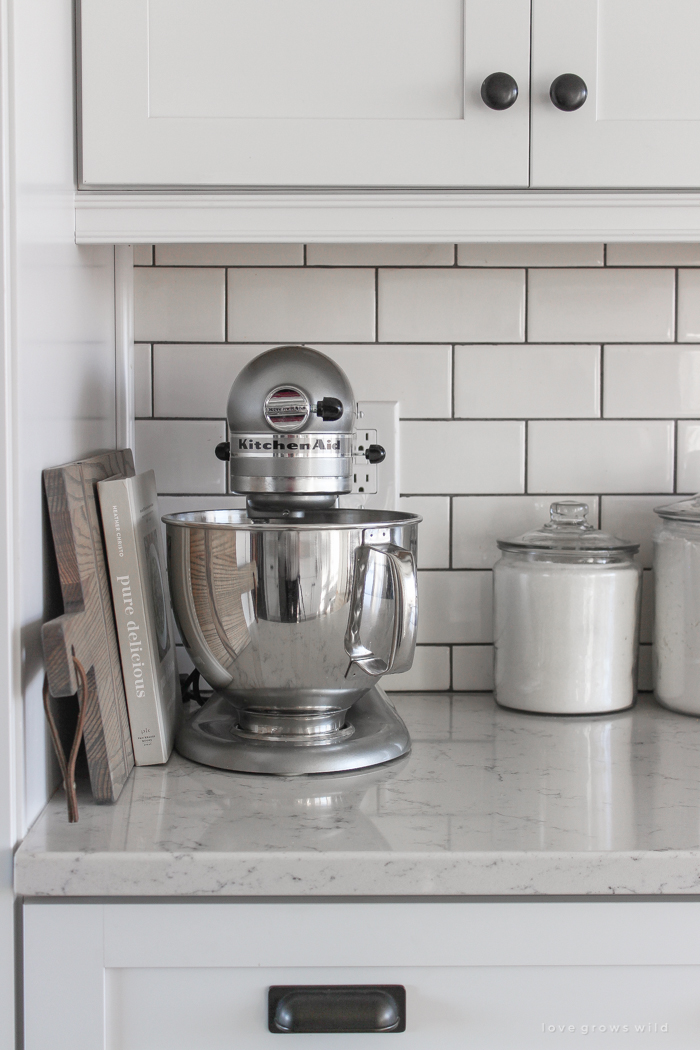
Related articles: